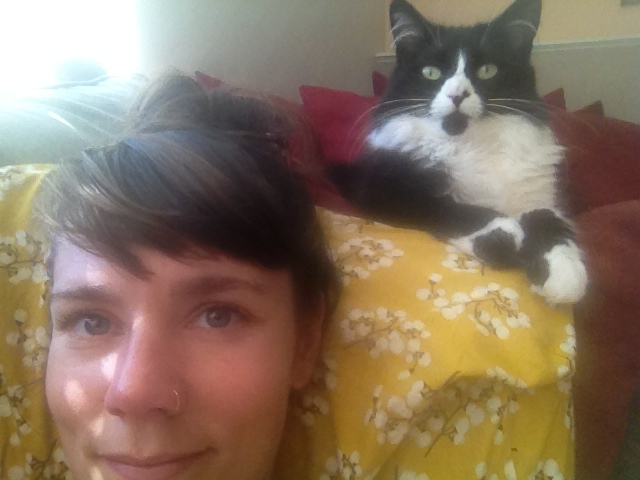We were thrilled when Kendra from the Washington State Coalition Against Domestic Violence offered to contribute a blog post about the Domestic Violence Housing First Project. Firesteel partner YWCA of Kitsap County provides tremendous support to survivors of domestic violence, and their services became even more impactful when they began participating in the project. (Side note: Special thanks to Kendra for sharing selfies with her cat at our request!)

Written by Kendra Gritsch, Project Specialist at the Washington State Coalition Against Domestic Violence
Home. When I think of home, I think of safety, security, love, and Miso (my cat). Unfortunately, for some, home is an unsafe and scary place. For many women experiencing domestic violence, home is a reason to stay in an abusive relationship.
We know that domestic violence is a leading cause of homelessness for women and children, as victims are often faced with the decision between two dangerous situations: abuse or homelessness.
The good news? It doesn’t have to be this way.
The Domestic Violence Housing First Project (DVHF), a collaboration between the Washington State Coalition Against Domestic Violence and domestic violence programs across the state, works to eliminate housing as a reason to stay in abusive relationships, and to prevent homelessness for victims fleeing violence. DVHF focuses on housing as a foundation to stability, with a strong emphasis on safety and giving survivors the freedom to choose how to best rebuild their lives. It is often the perception that survivors need confidential, domestic violence specific housing. This is the case for some survivors. But for many, staying in their current homes or moving into new permanent housing means they can turn their focus toward education, employment, parenting, and recovering from the trauma they experienced.
This has been the case for Victoria, a survivor of domestic violence who participated in Home Plus, the YWCA of Kitsap County’s DVHF program. Getting stable housing right away allowed her to re-connect with her community and focus on rebuilding herself.
Watch how the YWCA supports survivors like Victoria:
For the YWCA of Kitsap County, participating in DVHF challenged the program to shift their thinking about advocacy. This led them to understand the importance of listening to what survivors say they need, and the value of providing housing services as a part of domestic violence advocacy.
We have found that when survivors stabilize in housing first and then receive support from victim advocates, they feel safe, more stable, experience reductions in danger levels and increases in overall health and well-being. With a stable, permanent home they can move from surviving to living.
A home is so much more than a roof over your head. Home is hope, peace of mind and independence. It is doing the laundry, snuggling up to a pet, and watching the latest episode of House of Cards. It is comfort, security and a future free from violence. I think everyone deserves the opportunity to have all these things. Don’t you?
You can learn more about how to support survivors of domestic violence who are facing housing instability or homelessness by:
Learning more about the DVHF project.
Connecting with and finding ways to collaborate with your local domestic violence provider.
Domestic violence is a complex issue with no one simple solution, but we all have a role in ending and preventing it. Support our efforts to prevent domestic violence by running in the Refuse to Abuse 5k!

Pingback: “Heartbroken”: A Young Female Fan Reacts to Domestic Violence and the NFL | Faith & Family Homelessness Project()